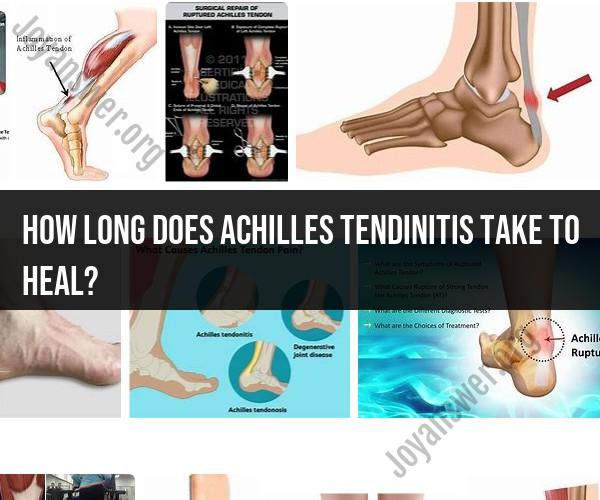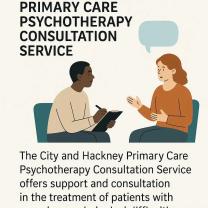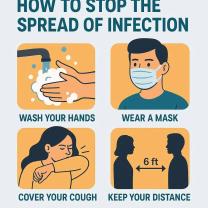How long does Achilles tendinitis take to heal?
The healing time for Achilles tendinitis can vary widely from person to person and depends on several factors, including the severity of the condition, the type of treatment, and how well the individual follows their treatment plan. Generally, Achilles tendinitis can take several weeks to several months to heal fully. Here are some considerations:
Severity of Tendinitis: Mild cases of Achilles tendinitis may resolve more quickly, often within a few weeks of conservative treatment. More severe cases may take longer to heal.
Rest and Activity Modification: Rest is a crucial part of the healing process. Avoiding activities that aggravate the condition and giving the Achilles tendon time to recover is essential. In some cases, this may mean limiting or modifying physical activities for an extended period.
Physical Therapy: Physical therapy is often recommended to help strengthen and stretch the Achilles tendon and surrounding muscles. The duration of physical therapy can vary but typically spans several weeks to a few months.
Orthotic Devices and Footwear: The use of orthotic devices, such as heel lifts or custom-made shoe inserts, can help reduce strain on the Achilles tendon. Wearing appropriate footwear with proper arch support is also important for recovery.
Medications: In some cases, non-steroidal anti-inflammatory drugs (NSAIDs) may be prescribed to reduce pain and inflammation. However, these are typically used for short-term relief and are not a long-term solution.
Casting or Bracing: In severe cases or cases that do not respond to other treatments, a cast or brace may be used to immobilize the foot and ankle temporarily.
Eccentric Exercises: Eccentric strengthening exercises, which involve lengthening the Achilles tendon under tension, are commonly prescribed by physical therapists to aid in the healing process.
Compliance with Treatment: Following the prescribed treatment plan diligently is crucial for a faster and more complete recovery. Failing to do so or returning to regular activities too soon can delay healing.
Individual Factors: An individual's age, overall health, and any underlying medical conditions can also impact the healing time.
It's essential to consult a healthcare professional, such as a sports medicine specialist or orthopedic doctor, for a proper diagnosis and treatment plan. They can provide personalized guidance and monitor your progress. In some cases, severe or chronic Achilles tendinitis may require more invasive interventions, such as corticosteroid injections or surgery, which can impact the overall healing time.
Achilles Tendinitis Recovery: How Long Does It Take to Heal?
Achilles tendinitis is an inflammation of the Achilles tendon, which is the thick band of tissue that connects the calf muscle to the heel bone. It is a common injury among athletes, but it can also affect people who are not active.
The recovery time for Achilles tendinitis varies depending on the severity of the injury. Mild cases may heal within a few weeks, but more severe cases may take several months to heal completely.
Managing Achilles Tendinitis: Healing Time and Strategies
There are a number of things that you can do to manage Achilles tendinitis and promote healing:
- Rest: Avoid activities that put stress on the Achilles tendon, such as running and jumping.
- Ice: Apply ice to the Achilles tendon for 20 minutes at a time, several times a day.
- Compression: Wrap the Achilles tendon with an elastic bandage to reduce swelling.
- Elevation: Elevate your leg when you are sitting or lying down.
- Nonsteroidal anti-inflammatory drugs (NSAIDs): Over-the-counter NSAIDs such as ibuprofen and naproxen can help to reduce pain and inflammation.
- Physical therapy: Physical therapy can help to strengthen the Achilles tendon and surrounding muscles, and improve range of motion.
Patience and Rehabilitation: Recovering from Achilles Tendinitis
It is important to be patient and consistent with your rehabilitation program. Achilles tendinitis can be a slow-healing injury, but with proper care, most people make a full recovery.
Here are some tips for recovering from Achilles tendinitis:
- Start slowly: Once you start to feel better, begin gradually returning to your normal activities.
- Listen to your body: If you experience pain, stop the activity and rest.
- Wear supportive shoes: Wearing supportive shoes can help to reduce stress on the Achilles tendon.
- Maintain a healthy weight: Excess weight can put additional stress on the Achilles tendon.
If you have any concerns about your recovery, be sure to talk to your doctor or physical therapist.













